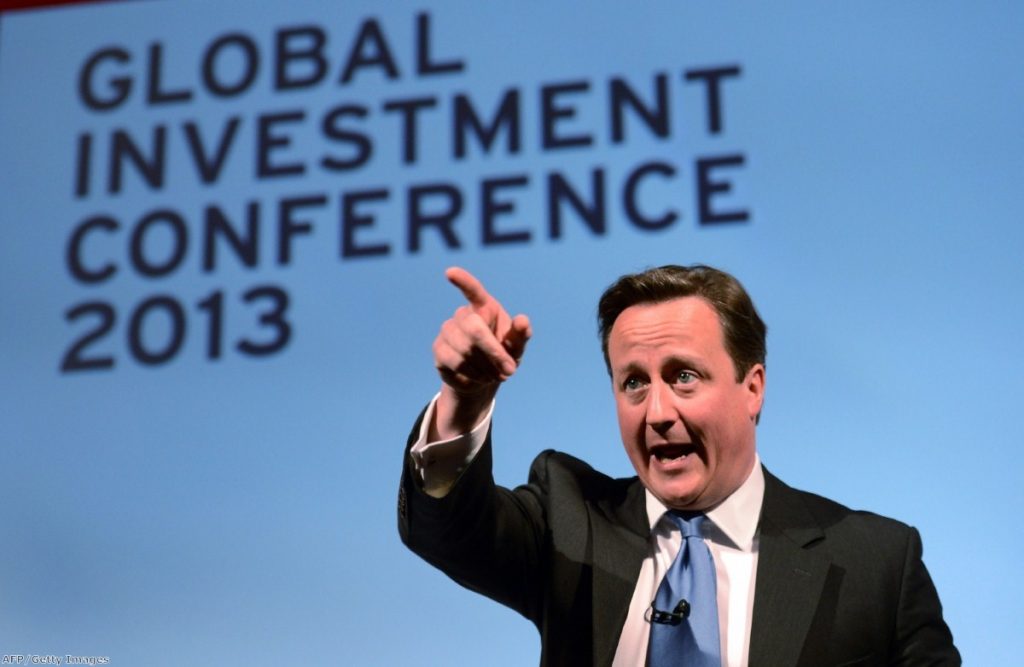Coming apart at the seams: EU referendum bill ruins Cameron’s honeymoon
The short period of unity the Conservative party has enjoyed since the death of Margaret Thatcher seemed to be falling apart today, as Downing Street offered a nervous and baffling response to a manoeuvre by Tory backbenchers.
A spokesman for the prime minister said he was relaxed about a backbench bill criticising the Queen's Speech for not containing legislation cementing a referendum on EU membership in the next parliament.
That put Cameron in the unusual position of having no opinion on a bill which specifically attacks his legislative agenda for the next year and suggests he is now scared of a confrontation with his parliamentary party.
The development comes as more senior political figures follow former chancellor Nigel Lawson in calling for a withdrawal from the EU, regardless of the deal Cameron secures beforehand in Brussels.


London Mayor and Conservative leadership threat Boris Johnson said stepping back from Europe would be a "shot in the arm" for the UK.
Former Tory chancellor Norman Lamont said the case for continued membership was often overstated and that the UK would be better off out.
Former Labour chancellor Dennis Healey said the "case for leaving is stronger than staying in".
The regular drip of statements by political grandees suggests the Lawson intervention gave other eurosceptics cover to go public.
"For someone of Nigel Lawson's stature to say that he has changed his position and now reached the view that the United Kingdom would be better off outside the EU – whether or not one agrees or disagrees with his judgment – that is the equivalent of throwing a hand grenade into a small building," former foreign secretary Malcom Rifkind commented
The amendment to the Queen's Speech could be voted on as early as Tuesday if Speaker John Bercow accepts it.
Downing Street is planning on giving Tory MPs a free vote, a move which raises the prospect of Cabinet ministers voting for an amendment which criticised their own Queen's Speech.
Cameron will be forced to watch the vote, powerless, in the US, where he will be on an official visit.
The fact he is overseas may be a boost to the prime minister, because it is hard to see how he would vote without damaging his reputation.
If he votes against it only to watch his own Cabinet secretaries and MPs support it, he looks weak. But if he votes for it and, as is likely, it is defeated, he seems a hostage to his own party.
Reports in the Sun suggested Cameron was prepared to support the amendment, which raised the truly extraordinary prospect of a prime minister rebelling against his own government.
Cameron will be hoping the amendment does not proceed. Analysis in the New Statesman found parliamentary convention dictates a prime minister must resign if an amendment to the Queen's Speech is successful.
The last time that happened was in 1924, when a motion of no confidence in Stanley Baldwin's Conservative government was passed by 328 to 251 votes, triggering his resignation and the creation of the first Labour government.
The amendment is purely symbolic, but supporters – who include John Baron, Peter Bone, John Redwood and Nadine Dorries – say it will create unstoppable momentum for the referendum in 2018.
The amendment would also have an interesting effect on the Liberal Democrats and Labour. Both parties have adopted a murky position on the referendum, refusing to either support the idea or outright reject it.
Ed Miliband has repeatedly said the government's focus is on the economy and he does not want to bind his hands on a referendum if he makes it into power in 2015. But he is wary of being caught on the wrong side of a much-publicised issue.
Nick Clegg also has a difficult argument to make. His party went into the 2010 general election promising an in/out referendum, but its pro-European credentials mean it is wary of a national plebiscite which many analysts believe it will lose.









